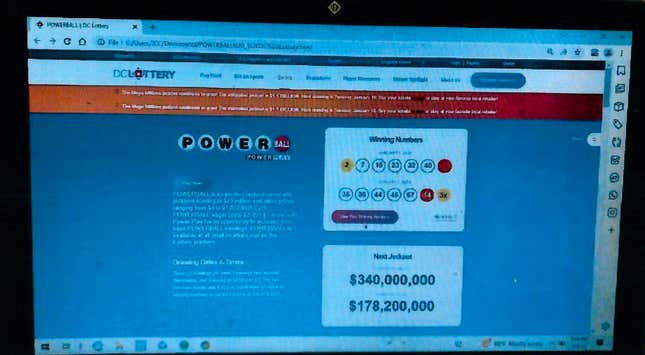[ad_1]
A D.C. resident is suing the Powerball lottery system and the D.C. Office of Lottery and Gaming after a technical error denied him a $340 million prize, and he accuses lottery operators of conspiracy, negligence and fraud.
In the lawsuit, plaintiff John Cheeks said that on January 6, 2023, he purchased a Powerball lottery ticket for a game whose winners were to be announced the next day. Cheeks checked the DC Lottery website on January 8 and saw that her numbers had been selected as winners, entitling her to the $340 million jackpot. But when Cheeks tried to claim his prize, he was told he didn’t win.
“Hey, this ticket is no good. Just throw it in the trash,'” Cheeks said he was told by the D.C. Office of Lottery and Gaming, as reported nbc washington, “And I gave [the worker] A harsh look. I said, ‘In the trash can?’ [They said] ‘Oh yes, throw it away. You will not get paid. There is a dustbin right there.”

According to DC Lottery operators, the chix’s numbers were posted in error by TaoTee, the digital advertising agency and contractor that operates the DC Lottery website on behalf of the local government.
Taoti, who is also being sued by Cheeks, claims the man’s numbers were posted on the DC Lottery website as part of quality assurance testing and “drawn for the January 7, 2023 Powerball drawing There were no numbers.” Furthermore, Taoti claims that the incorrect numbers were posted on January 6, the day before the official drawing. Taoti removed Cheeks’ numbers from the DC Lottery website on January 9, three days after Cheeks’ numbers were posted online.
Rick Evans, Cheeks’ attorney and a partner at the firm McCarthy Wilson LLP, does not buy the argument presented by D.C. lottery operators. In a statement, Evans pointed out that neither Powerball nor the DC Lottery made any public service announcement that the January 7 game was compromised.
“They never stopped selling tickets for the next Powerball drawing based on their winnings that were never paid, and they never announced their mistake to Mr. Cheeks or the public. He never stopped the game, Evans said, and offered each player a refund of their money from the compromised draw if that happened.
Taotie founder and CEO Brent Lightner told Gizmodo via email on Wednesday that the company cannot comment on pending legal matters “no matter how frivolous they may be.” Taoti has denied Cheeks’ allegations of wrongdoing and instead claimed that Cheeks actually purchased his Powerball ticket using test numbers that were mistakenly posted before the January 7 drawing.
Gizmodo contacted the DC Office of Lotteries and Gaming Multi-State Lottery AssociationThe nonprofit that helps operate lottery games nationally, which is also named in the lawsuit, was reached for comment Wednesday morning but did not immediately respond.
Evans said the case raises important questions about the lack of safeguards to prevent these types of errors in lottery operations. Cheeks is asking the court to award him the entire $340 million Powerball jackpot and millions of dollars in damages. The next hearing of the case is to be held this Friday.
“It’s not just about numbers on a website; It is about the credibility of institutions that promise life-changing opportunities, while making huge profits in the process,” Evans said.
[ad_2]

